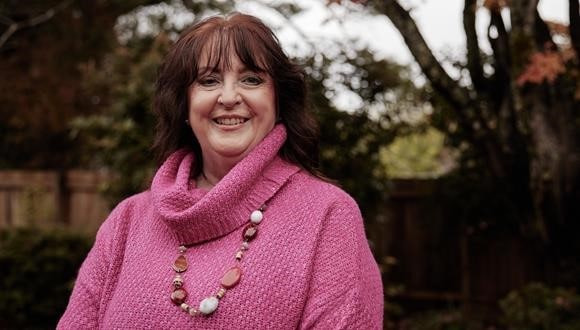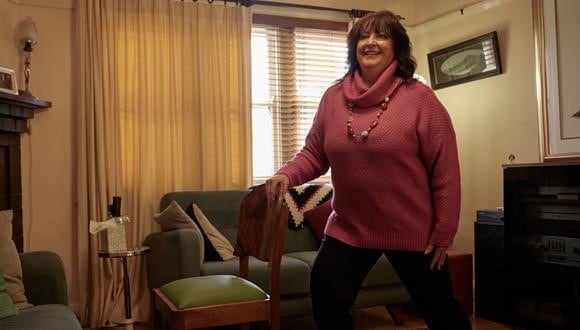NO-GAP JOINTS PROGRAM: HOW IT HELPED JANET WITH HER KNEE REPLACEMENT SURGERY
Published May 2024 | 4 min read
Words by Carrie Hutchinson
After a fall left Janet in acute pain and needing knee replacement surgery, she discovered the benefits of our No-Gap Joints program.
About 18 months ago, Janet took a tumble going up some stairs while volunteering at her local charity store. Soon after, she began having knee problems.
At first, her doctor prescribed some anti-inflammatory medicine, pain killers and rest. Then she tried physiotherapy, steroid injections and fluid removal, but after a year the pain was growing worse.
“I was trying to live with it,” says the 67-year-old, “but it wasn’t getting any better. It became arthritis, so I started inquiring with some orthopaedic surgeons.”
Janet, an HCF member for almost 40 years, began exploring knee replacement surgery and the related costs.
“I didn’t want to be in the public waiting queue, but I was finding most surgeons were quoting a gap of about $6,000,” she explains. “So, I started looking online to see if there were any providers on the HCF website who would do less of a gap. That’s when I came across the No-Gap Joints program. It sounded too good to be true!”

What is the No-Gap Joints program?
For knee or hip replacement surgery, HCF gives eligible members* greater flexibility and peace of mind, thanks to our No-Gap Joints program. It means no out-of-pocket expenses (other than any hospital excess payable), from hospital admission through to post-surgery rehabilitation, when a member is treated through a participating hospital and surgeon in NSW and Victoria.
Eligible members are accepted into the program if they meet the clinical criteria outlined by participating clinicians and hospitals*.
Members can get:
- primary hip and knee replacements with no out-of-pocket costs (other than any hospital excess payable) through participating private hospitals and clinicians in NSW and Victoria
- costs covered^ for the surgery and post-surgery rehabilitation that is organised by the hospital, so you can focus on recovery
- continuity of care with the same health professionals and hospital coordinating your care from admission through to post-surgery rehab
- treatment with a participating surgeon in a holistic package including post-surgery rehab.
“I chose Macquarie University Hospital and friends had given me good reports,” says Janet.
The Orthopaedic Institute at Macquarie University Hospital prioritises patient care before surgery as well as aiming to ensure an early discharge when suitable, allowing patients to continue their rehabilitation from the comfort of their home. Janet researched participating surgeons before making a final decision. She had her first appointment at the hospital in February 2024 and went in for her operation in March.
Going into hospital as a private patient, Janet had her own room. There was a hotel onsite, where Janet’s husband stayed while she was an inpatient as they live in a regional area. HCF also contributed towards their accommodation and travel costs due to the distance between their home and the hospital, which Janet says was “another plus”.
Janet’s only out-of-pocket expense for the procedure was the hospital excess, which she expected, and one session with the physio in the pre-admission clinic – “but the rest was covered,” she adds.
Australians and joint replacement surgery
In 2022, 65,568 knee replacement procedures were performed, increasing to 78,429 in 2023 – making it the most common joint replacement in Australia. Osteoarthritis is the most common condition leading to knee and hip replacement surgery.
With knee replacement surgery on the rise in Australia, waiting times for hip and knee replacements in the public hospital system continue to grow. In 2022 to 2023, people waited an average of 308 days for a total knee replacement and 175 days for a total hip replacement.
According to Canstar, knee replacement costs can start at about $25,000 without health insurance. And according to our Cost Indicator tool, even those with private health insurance can pay thousands of dollars in gap fees, between $1,175 and $6,771, which is why HCF’s No-Gap Joints program is so valuable for eligible members.
Initiatives like our No-Gap Joints program can help ease the strain on the public health system and reduce out-of-pocket costs, often leading to improved health outcomes for our members.

Getting Janet back on her feet
After her knee replacement surgery, Janet was in hospital for three nights before being discharged to head home for post-surgery rehab.
“My physio was already organised to come after the operation, and that’s been great,” she says. “It was so wonderful to have a physio come to my home, instead of having to struggle to get to a rehab centre.”
After completing eight sessions with her physio over six weeks, Janet is now up and about and walking without crutches. She says she will continue to do her exercises herself until her knee is completely better; these include moving up and down on her tip toes, mini squats, calf lunges and hamstring curls.
“My recovery has been a lot faster than I thought it would be,” she says. “You just have to do your exercises and stay positive. My doctor has been really pleased with my progress!”
Many doctors say it takes between six and 12 months to recover fully from knee replacement surgery, but Janet is well on her way to feeling herself again. She hopes to begin light exercise in the next couple of months.
“Going through the No-Gap Joints process like I did, you get plenty of tips on preparing yourself and your house with all the equipment needed, like toilet rails. No-one else tells you all that.”
You can find out more about preparation, surgery and recovery in HCF’s guide to knee surgery.
Janet says her experience with the No-Gap Joints program has made a huge difference to her recovery and her future plans.
“Without HCF, I would have been thousands of dollars out of pocket, or I would have had to use the public system,” she says. “With the money I saved, my husband and I will be able to celebrate our 40th wedding anniversary in Hawaii.”
Do you have knee replacement surgery coming up or would you like to learn more about the procedure? Be prepared by using our Preparing for Hospital tools.
Janet’s tips for preparing for knee replacement surgery
- Once you’ve chosen a hospital and surgeon, book an appointment. Before you go, consider asking your GP for a referral to have a weight-bearing X-ray, so you can bring this to your first appointment with the surgeon. This will likely save you a lot of time.
- If you have a walk-in shower, you may like to buy a shower chair – you likely won’t be able to easily stand and balance while you wash. Try to get one with a back, not a stool as I found it to be safer.
- Look into getting a toilet rail to help you get up and sit down. You can sometimes hire these from chemists and mobility stores.
- If you live 100km or more from your hospital, HCF may contribute a travel allowance for the night before and after your surgery. Just make sure you speak to them beforehand and ask your surgeon to sign the relevant forms.
No-Gap Joints puts you in control
Our No-Gap Joints program for primary hip and knee replacements gives eligible members peace of mind, with no out-of-pocket costs from hospital admission through to post-surgery rehab*. We’ve partnered with several private hospitals and clinicians in NSW and Victoria to give greater flexibility and continuity of care while keeping costs down.
If the No-Gap Joints program doesn’t work for you, use our Find a Provider tool to find a participating provider and hospital to help reduce out-of-pocket expenses.
Related articles
How to care for joints while exercising
Maintaining healthy joints is important as you age. Understanding how keeping joints safe when playing sports and exercising can support your wellbeing at every stage.
Rest easy with our No-Gap Joints program
Have you been delaying joint replacement surgery because you haven’t been able to afford it? Our No-Gap Joints program makes it easy for you to take back control of your health.
An overview about arthritis
Joint pain and stiffness can often be symptoms of arthritis. Here’s a guide to different types, including osteoarthritis and rheumatoid arthritis, and their related treatments.
5 knee strengthening exercises
With the rise of knee replacement surgery over the past decade, we look at how you can strengthen your knees with this simple, no-equipment workout in the comfort of your home.
IMPORTANT INFORMATION
* Eligible members will need to have HCF hospital cover including primary hip and knee replacements for 12 months (excluding Overseas Visitors Health Cover). Members must meet clinical criteria and be accepted into the program by a participating clinician and hospital. Program is only available at participating hospitals for a limited time. For full program terms and conditions, including list of participating hospitals and program end dates, visit hcf.com.au/nogapjoints
^ Excludes any hospital excess payable.
This communication contains information which is copyright to The Hospitals Contribution Fund of Australia Limited (HCF). It should not be copied, disclosed or distributed without the authority of HCF. Except as required by law, HCF does not represent, warrant and/or guarantee that this communication is free from errors, virus, interception or interference. All reasonable efforts have been taken to ensure the accuracy of material contained on this website. It’s not intended that this website be comprehensive or render advice. HCF members should rely on authoritative advice they seek from qualified practitioners in the health and medical fields as the information provided on this website is general information only and may not be suitable to individual circumstances or health needs. Please check with your health professional before making any dietary, medical or other health decisions as a result of reading this website.